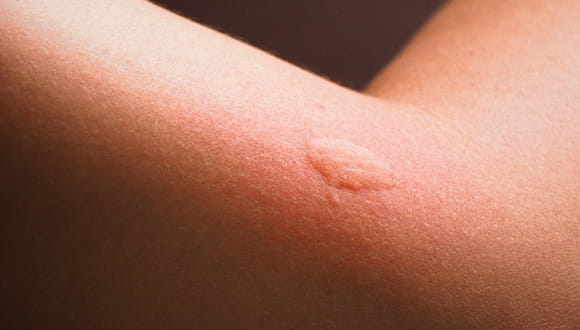When Should You Worry About a Mosquito Bite?
Aug. 3, 2022 - Katie McCallumWe're all familiar with the classic mosquito bite symptoms: red, swollen bumps on the skin that eventually start to itch. But what about when mosquito bites seem more worrisome than usual?
For instance, when a bite swells to the size of a dime, nickel or even bigger? Or when you scratch one to the point of infection? Mosquito bites are always annoying, to be sure, but can they ever be a serious health concern?
Most mosquito bites are typically harmless, albeit annoying
When a mosquito comes in for a blood meal, saliva gets injected into your skin. Since this saliva contains foreign, irritating substances, your body reacts to it — creating the bump and redness and itchiness associated with mosquito bites.
It's a normal inflammatory reaction. The red bump appears shortly after the bite, while itchiness sets in somewhat slower — peaking around 24 to 36 hours post-blood sucking.
In most cases, a mosquito bite is a harmless nuisance that results in minor irritation and resolves on its own in a few days. It's important to avoid scratching a mosquito bite during this time, though, since this can increase the risk of a bite becoming infected. While rare in the U.S., mosquito saliva is also a way for diseases to spread. More on that risk later.
How to get rid of mosquito bites
As mentioned, mosquito bites aren't typically cause for concern. But that doesn't mean they're easy to ignore.
The CDC recommends treating mosquito bites by washing them with soap and water.
You can help further ease symptoms by:
- Using an ice pack to reduce swelling
- Applying calamine lotion or an over-the-counter hydrocortisone cream to relieve itching
Another way to help reduce your body's itch response is to apply a paste of baking soda and water to the bite for ten minutes, then rinsing with water.
And, remember, don't scratch! If a mosquito bite becomes infected, symptoms can take longer to resolve and even worsen.
Some people are prone to "Skeeter syndrome"
Not everyone has a normal inflammatory reaction to a bite.
Some people experience an allergic reaction to mosquito saliva. The most common type is a larger — though still localized — allergic reaction called Skeeter syndrome.
These reactions can range in size from about one to four inches. They're characterized by redness, itchiness, swelling and warmth and they can sometimes even blister and be painful. In more severe cases, fever and general fatigue can result.
The symptoms of Skeeter syndrome typically develop within a few hours of the bite and can continue to progress over the course of 12 hours or more.
Skeeter syndrome is rarely a serious medical concern, though. It typically resolves on its own within three to ten days.
In the meantime, pain relievers can help relieve pain and fever, while oral antihistamines and hydrocortisone cream can help reduce itching.
Those most at risk for developing Skeeter syndrome include:
- Infants and children
- People with weakened immune systems
- Immigrants of a new region or travelers
- People who are frequently outdoors
One study suggests that genetic factors may also predispose a person to experience more intense reactions to mosquito saliva.
When to worry about a mosquito bite
Mosquito bites becoming concerning when a person experiences a more serious allergic reaction or if the bite becomes infected.
Skeeter syndrome, the most common allergic reaction, is typically mild, but it can become severe — in such cases, swelling becomes extreme and interferes with movement, vision or eating and drinking. It's important to contact your doctor if this occurs, since prescription corticosteroids may be required for treatment.
Though rare, systemic allergic reactions to mosquito bites are also possible.
Seek immediate medical attention if you experience any of the following after a bite:
- Throat swelling
- Trouble breathing
- Wheezing
- Hives
- Nausea and vomiting
- Lethargy
These are signs of anaphylaxis, a potentially life-threatening allergic reaction.
Lastly, if you've been scratching a mosquito bite and you notice signs of infection — red streaks spreading outward from the bite, warmth — it's important to closely monitor your symptoms. If they worsen, especially if fever develops, contact your doctor.
Mosquito saliva can transmit diseases
Mosquito bites aren't just itchy and annoying. They're also a way for serious germs, such as West Nile or Zika virus, to invade and spread.
Mosquito-borne illness is a fairly rare occurrence in the U.S., but even a slight risk still warrants taking steps to prevent mosquito bites as much as possible.
Avoiding being bitten can also help avert future episodes of Skeeter syndrome, for those prone to this allergic reaction.
One of the most important forms of mosquito control is to wear repellant when you plan to be outdoors.
Additional ways to protect yourself from mosquitos include:
- Wearing long sleeves and pants outdoors when possible
- Covering baby strollers or carriers with mosquito netting
- Only leaving a door or window open if it has a screen
- Running a fan on your porch or other outdoor seating areas to create turbulent airflow
- Eliminating standing water around your home, such as water that collects in flower pots


